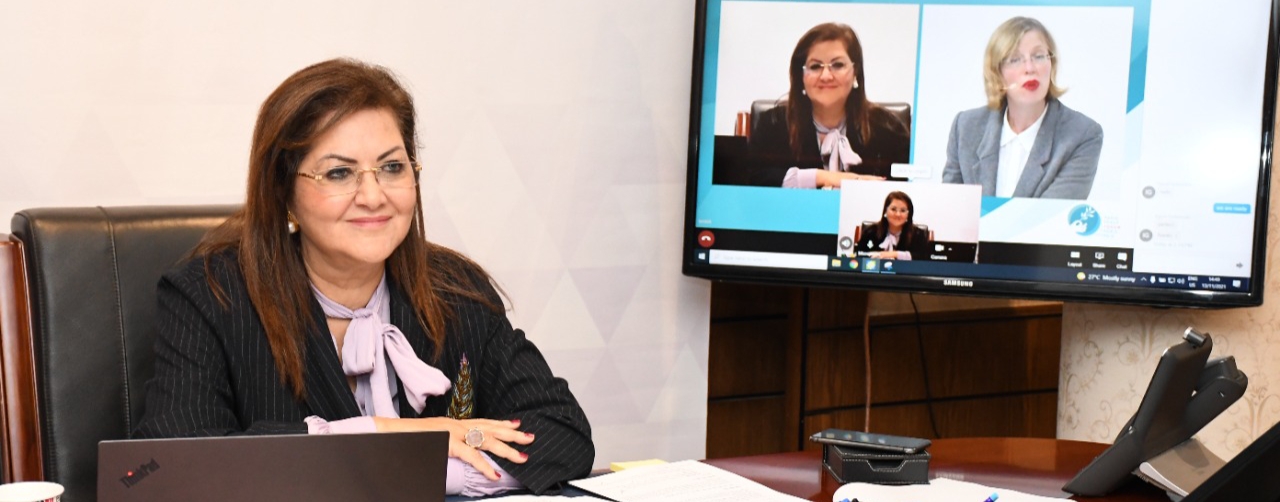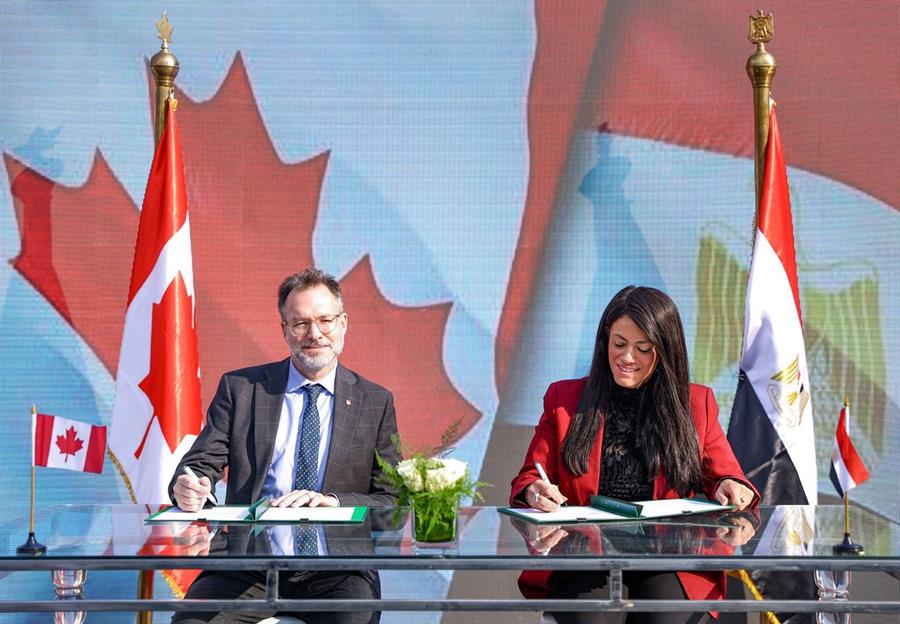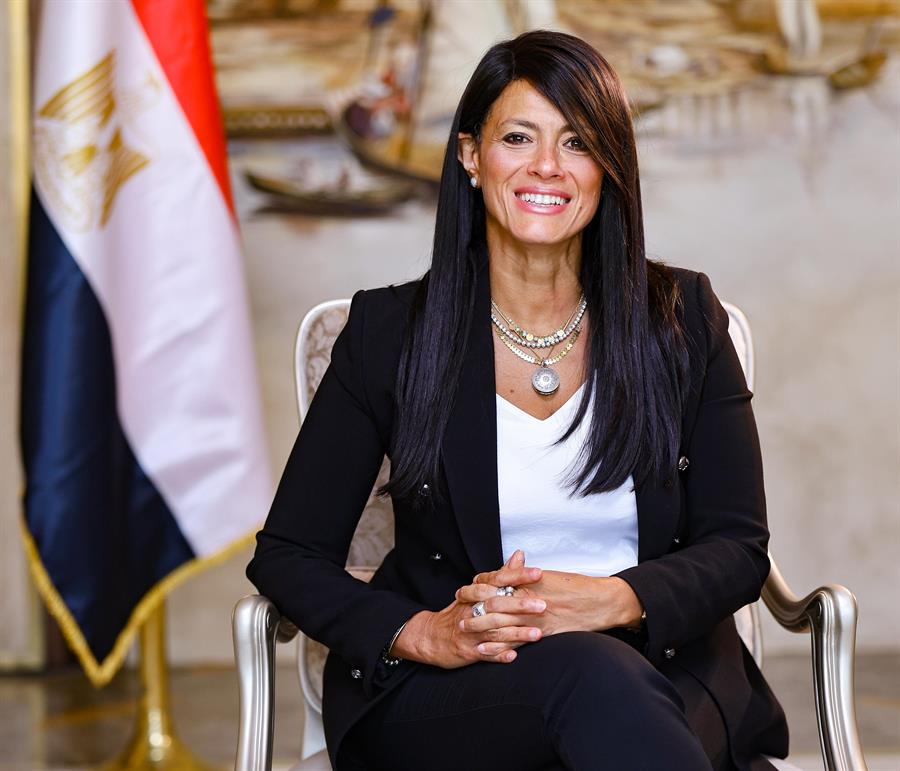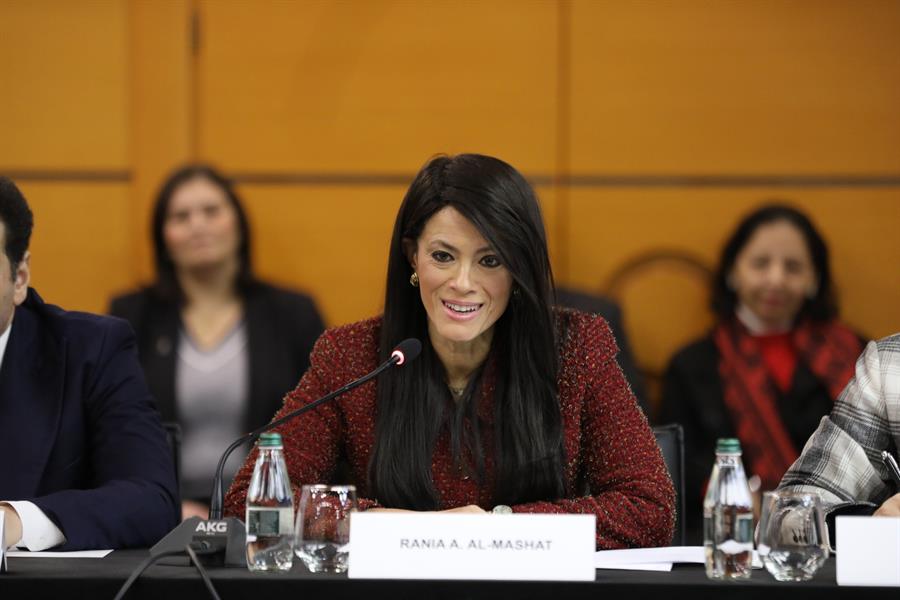Egypt’s Minister of Planning and Economic Development participates in the work of the 4th annual Paris Peace Forum

13 November 2021
Egypt’s Minister of Planning and Economic Development, Dr. Hala El-Said asserted recently that the Egyptian state seeks to deepen partnership with the sector through several investment platforms, led by the Sovereign Fund of Egypt (TSFE) as well as through some projects, the most important of which are infrastructure projects and investments that target green recovery and renewable energy.
This came during her participation today, via video conference, in the discussion session entitled "Financing the Environmental and Social Transformation: How to Reform Capitalism", which was held during the work of the fourth edition of the Paris Peace Forum 2021 in France.During her speech, Dr. Hala El-Said explained that environmental and social transformation has become a necessity for the economy, whether in the face of climate change or in response to structural social and economic changes that affect value chains worldwide.El-Said added that capitalism is currently facing a triple crisis, explaining that the health crisis has ignited an economic crisis with so far undetermined consequences for financial stability, in addition to a climate crisis that poses great risks to human well-being.El-Said added that Egypt is one of the developing countries, which represents a hotspot for climate vulnerability despite its lower contribution to global greenhouse gas emissions.El-Said stressed that all these successive crises represent major challenges to livelihoods, public health, supply chains, infrastructure, agriculture, and food security, which may lead to reversing the development gains that have been achieved with great effort.
El-Said pointed out that creating a more flexible form of capitalism that resists climate challenges will require innovative and structural interventions from a transition to a green economy.Regarding participation in establishing markets and the relationship between the government and the private sector, El-Said stressed the importance of the policy aiming to participate in the creation of markets with the private sector, rather than adopting the market-defining approach only, with an orientation towards green through regulatory measures, and directing financing.El-Said added that this requires a country that innovates, takes risks, and invests alongside the private sector, stressing the importance of the state playing a prominent role in providing the long-term investments needed in the field of green transformation.El-Said also referred to the government's role as a key partner in the green transformation process, as it has a mechanism to provide capital, directly or indirectly. El-Said added that the role of the government, whether in Egypt or any other country, about investing in green infrastructure and technology should not crowd out private investments, explaining that the government has a duty towards its most vulnerable citizens to prepare to face the future.About public procurement as a means to achieve green goals, El-Said explained that governments can also benefit from redesigning procurement contracts and creating mechanisms to mobilize innovation and funding from multiple actors to achieve green goals. “Governments can redesign financial instruments on a large scale toward green goals, including directing public banks toward allocating more money to green projects,” El-Said explained.El-Said stressed the importance that the green transition does not come at the expense of macroeconomic stability in terms of high debt, explaining that developing countries, including Egypt, are more vulnerable to being affected by climate change, adding that Egypt is keen on developing its economy.El-Said also indicated the need for more foreign investments in green technologies instead of the need for debt so as not to burden future generations and state coffers, stressing the need to introduce a more accurate approach to green transformation that takes into account the social and economic situation of each country.El-Said reviewed the Egyptian experience in public-private partnerships and innovative financing solutions.Moreover, She emphasized that the Egyptian government has had an active and pioneering role in taking on major challenges in long-term infrastructure projects over the past decade.
El-Said also reviewed several projects that represent models of partnership between the public and private sectors, noting the "Decent Life" initiative as one of the manifestations of the importance of public investment in sustainable development, adding that the "Decent Life" initiative aims to transform more than 4,670 Egyptian villages into sustainable rural communities. El-Said indicated that this initiative has been classified by the United Nations as one of the best international practices for sustainable development goals; Because of its positive impact in reducing poverty rates, as it is the largest development initiative in the world targeting more than 58 million citizens of Egypt.El-Said also touched on the Benban project as the largest solar energy complex in the world, explaining that in 2015, the government also launched a "feed-in tariff" for renewable energy to encourage the private sector to invest in this important sector.As a result, Egypt now hosts the world’s largest solar farm in Benban Aswan, which was set up through multiple public-private partnerships for €4 billion, generating 2 gigawatts of electricity and creating decent jobs for the local community in Aswan.El-Said also referred to The Sovereign Fund of Egypt (TSFE) as a vehicle for public-private partnerships and innovative financing.El-Said pointed to the agreements recently signed by the fund to develop the green hydrogen facility as a feedstock for the production of green ammonia, which represents the cornerstone investment in building the fund's sustainable green portfolio.In the same context, El-Said touched on the issuance of public green bonds worth $750 million for the first time in Africa and the MENA region, in addition to the Egyptian private sector's readiness to launch "Private Green Bonds" with a value ranging between $120-200 million.Regarding institutional reforms to confront climate change and promote environmental transformation, El-Said explained that Egypt has taken several steps at the level of policy development and institutional preparation to mainstream climate change in the national planning process, in addition to implementing many projects. The reforms included the application of "Environmental Sustainability Criteria" as a joint effort between the ministries of planning and environment to make the investment plan projects green, as green projects for the fiscal year 2021/22 reached 30%.
El-Said added that the ministries of Planning and the Environment are working closely with other relevant ministries, as well as the private sector to agree on a set of "Green Incentives" to encourage the private sector and entrepreneurs to shift towards a green economy. El-Said also indicated that the Ministry of Planning signed a memorandum of understanding (MoU) with the Alexandria Businessmen Association, to support their efforts towards green transformation.El-Said affirmed that Egypt is working on formulating a national strategy for hydrogen to encourage the use of blue and green hydrogen as a zero-emissions energy source.El-Said added that the sustainable development strategy: (Egypt Vision 2030) has been updated to respond to new and emerging challenges, including population growth, climate change, and water scarcity, taking into account regional changes and the impact of the Corona pandemic.









